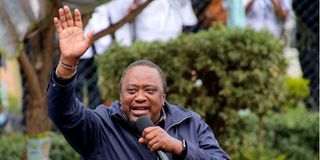A tribute to Uhuru, Kenya’s Abraham Lincoln

President Uhuru Kenyatta addresses wananchi at Othaya town in Nyeri county on August 6, 2022.
What you need to know:
- President Kenyatta has paid a heavy political price after Deputy President William Ruto exploited anti-Odinga ethnic sentiment.
- After the noise of this year’s election dies down, we shall discover what a great leader we have had in State House these past 10 years.
President Uhuru Kenyatta is a tough act to follow for whoever wins the August 9 elections and succeeds him at State House.
He is set to leave office, having outperformed all the presidents since independence put together on key metrics such as building and modernising Kenya’s infrastructure, strengthening the country’s homeland security and expanding opportunities for children from poor families through bursaries.
There is hardly any part of the country left untouched by his Big Push public investments; be it a major highway opening up the countryside, a dam storing water for irrigation or a last-mile electricity project connecting a school or trading centre to the national grid.
Where I come from, for example, he is widely regarded as Kenya’s first truly national President given the manner he overlooked age-old ethnic feuds dating back to his father’s reign in the 1960s and 1970s and built political bridges in his second term in office.
Uhuru Market, a modern small traders’ market in Kisumu with space to accommodate 10,000 businesses, is named after President Kenyatta to immortalise his development legacy in this part of the country.
He probably deserves his name on more landmarks.
Understandably, simple gestures like this don’t make sense to generations of Kenyans socialised into ethnic bigots and poorly educated on complex matters of nation-building and cohesion in a multiethnic society.
Well-trodden path
Voted into office twice owing largely to the backing of a strong alliance of two communities that have produced all of Kenya’s four presidents between them, President Kenyatta might well have taken the well-trodden path of exclusion that appeared to work for his three predecessors just fine and retired an ethnic hero.
With a healthy majority in Parliament and the absolute confidence of the security agencies, he could have ignored the secessionist sentiment expressed by sections of the political elite in those tense moments after the nullification of his 2017 re-election by the Supreme Court and governed with little problem.
Like America’s Abraham Lincoln, who fought the slavery-obsessed Confederates to preserve the Union, President Kenyatta chose to break ranks with the ethnic bigots and hegemonists in his ruling Jubilee Party to cooperate with his rival Raila Odinga to defuse the tension that threatened Kenya’s political stability.
The promise of national unity the two leaders gave on March 9, 2018, remains elusive, partly due to political ambitions and pushback by the ethnic supremacists.
President Kenyatta has paid a heavy political price after Deputy President William Ruto exploited anti-Odinga ethnic sentiment and successfully fomented rebellion against him in central Kenya.
But for daring to imagine a politically inclusive country, the President has emerged as the bigger man from his political battles with his ambitious deputy.
After the noise of this year’s election dies down and Kenyans start to objectively discuss President Kenyatta’s legacy, we shall discover what a great leader we have had in State House these past 10 years.
[email protected]. @otienootieno





